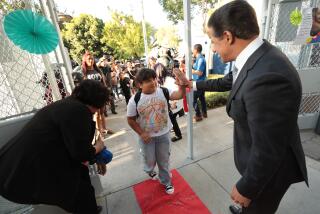No exit
IN CALIFORNIA’S continuing school accountability wars, the underdogs -- that would be the students -- prevailed last week. On Friday, a Superior Court judge upheld a temporary injunction against the state’s high school exit exam, so students do not have to pass it to graduate this year.
The exam, which requires students to prove they’ve learned what the system has theoretically taught them, has been under fire since it was introduced in 1999. In 2003, the Coalition for Educational Justice and other grass-roots activist groups successfully lobbied school districts to postpone the test. That was but a brief lull in the war; the skirmish that resumed has again been resolved in the embattled students’ favor. For now.
I consider this latest development a victory, yet I feel little cause for rejoicing. The fight for public education is ultimately not about scoring points but about changing hearts and minds -- and we are a long way from that. We are a long way from convincing the public that a school system that is overwhelmingly black and Latino is worth not simply saving but improving.
In an ideal or even rational world, this would not even be a fight. An old-fashioned notion of common good would guide reform, and we would all accept the importance of investing in those who may not look like us -- because, in the end, we all inhabit the same space.
But such an appeal makes taxpayers and pundits uncomfortable because it comes too close to invoking racial equality. For many, racial justice is a bugaboo of the ‘60s, something we were supposed to have laid to rest long ago, especially when education’s concerned. Reviving it feels retro at best, an admission of failure at worst. So it is that the debate about education reform tends to be an abstract and relatively polite debate over ideology, theory, funding -- anything but the students themselves and their demographics.
Sure, we’ll state it sometimes as fact: 70% of students in the Los Angeles Unified School District are Latino, a good portion English-language learners. If we’re feeling bold, we may even note that African American students, who make up only about 10% of the student population, are failing at an alarming rate -- and have been for decades.
But we will not connect the dots and say that color is a factor in the failure, that society at large doesn’t get exercised about it because the kids to whom we’ve ceded the public schools are largely poor, immigrant, brown or black. Virtually all politicians pledge to stand up for the children, of course, and most of us vote for school bond measures almost reflexively. But that’s as far as our consideration goes. Few of us ask, even of ourselves: Whose child?
Then there’s accountability. Like so many other current debates, the one about high-stakes testing has become reductive and polarized. Most often it pits student accountability against non-accountability, personal initiative against government inertia, character against amorality. (This is the same argument used in many racial matters, such as affirmative action and gang violence: It’s the individual, not the system or society, that must change.)
But placing the burden of responsibility entirely on the student is, to say the least, unfair. It is saying that the student must be punished -- tested -- for the failures of the system, chiefly the failure to care. It is a burden that no parent should wish on his or her child, especially a teenager who is already grappling with enough pressures.
When I think of such pressures, I think of DeAndre, a junior I met at Locke High School in the heart of South Los Angeles when I was teaching a writing workshop there. DeAndre was a pleasant, unassuming 16-year-old who was artistically gifted and extraordinarily tall; for reasons I never quite understood, he was classified as a special education student. His goal was to graduate and study art at a college like Otis, or, failing that, at a local junior college.
What DeAndre wanted most was not to stand out -- tough to do when you’re 7-feet-plus -- but to blend in. He wanted the chance to do what he thought all normal high school students did: Perform honorably in school and then build a real future from long-standing dreams.
I don’t know what happened to DeAndre. But I do know what’s happened to Locke, and the odds of DeAndre or any graduate doing well, however well they did in school or on an exit exam, aren’t nearly as high as they should be. The question is, who’s failing whom?
More to Read
Sign up for Essential California
The most important California stories and recommendations in your inbox every morning.
You may occasionally receive promotional content from the Los Angeles Times.










